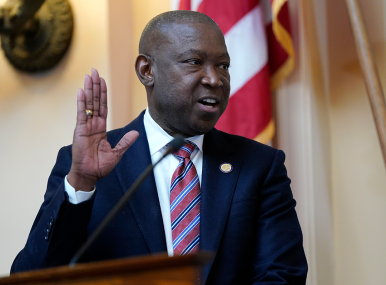

Saving grace
Richard Foster //January 30, 2024//
When Del. Don L. Scott Jr., D-Portsmouth, was sworn in on Jan. 10 as the first Black speaker of the house in the Virginia legislature’s 405-year history, he also was likely the first leader of that illustrious body to have served time in federal prison.
Reminiscent of the literary trials of Jean Valjean, Scott’s is a story of the redemptive powers of hard work and second chances. More than that, however, it offers instructive lessons in the power of mercy and the value of putting aside political divisiveness.
Scott had served in the Navy and was nearing graduation as a law student when he was arrested in May 1994 while studying at Louisiana State University’s law library. Prosecutors alleged he headed a plot to sell more than a pound of crack cocaine. But Scott and his attorney maintained that Scott, who didn’t use drugs, was nothing more than a “mule” who knowingly agreed to pick up $26,000 in drug money because he was broke and needed money.

“I wish 53-year-old Don could slap the hell out of 28-year-old Don,” Scott told The Virginian-Pilot in a 2018 interview.
Though he’d graduated law school and passed the bar exam, Scott took a plea deal and ended up serving almost eight years in a federal prison in Texas, where he helped other inmates with legal briefs and taught some to read.
After Scott was released from prison, his uncle helped him find a construction job and a position doing the books for a friend’s used auto dealership. Within eight months, Scott was hired by national workforce development consultancy KRA and worked his way up over a decade to become the company’s third-ranking executive.
His former boss, KRA Chief Strategy Officer Patrick Boxall, told The Virginian-Pilot that it’s “ingrained in [KRA’s] culture to judge people based on their possible future contributions, not on where they have been.”
By 2014, Scott passed the Virginia Bar Exam but still had to appeal to the Board of Bar Examiners’ Character & Fitness Committee, which in 2015 approved his admission to the state bar at age 50.
Five years later, in 2019, Scott had already served as chair of the Portsmouth Economic Development Authority and was elected to represent Portsmouth in the House of Delegates with 66% of the vote. He’s now a partner at the law firm of Breit Biniazan and a three-term delegate who served as House minority leader before his caucus unanimously nominated him for speaker.
During a recess amid his emotional first day as speaker, Scott’s well-wishers included former Gov. Bob McDonnell, whom Scott embraced warmly. McDonnell, whose own federal conviction on corruption charges was overturned by the U.S. Supreme Court in 2016, had restored Scott’s right to vote and run for office, paving the way for the historic moment.
“Thank you, thank you, thank you,” The Washington Post quoted Scott saying to the former governor.
During a time when the nation is deeply politically divided, with the prospect of a bitter presidential rematch ahead, it says a lot that the person who seconded Scott’s formal nomination as speaker was Republican Del. Terry L. Austin of Botetourt County, a friend who called it “an honor.”
While it’s debatable if the fabled “Virginia Way” ideal of legislative bipartisanship and civility in favor of governing for the public good ever really existed — or actually did good — the optics of Republicans and Democrats coming together after years of gridlock lends hope that the parties may find greater consensus this session on at least some of the commonwealth’s important issues — notably the state budget, mental health, education, data centers and industrial site development, if not tougher ones like abortion, gun control or automatic restoration of felons’ rights.
As Del. Luke Torian, D-Prince William County, said, summing the day up during his formal nomination of Scott as speaker: “Del. Scott understands the redemptive power of God.”
g
















